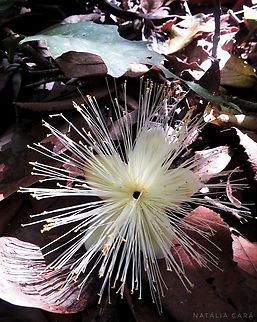
Appearance
The pequi tree grows up to 10 m (30 ft) tall. It is common in the central Brazilian cerrado habitat[1] from southern Pará to Paraná and northern Paraguay. Its leaves are large, tough, hairy and palmate, with three leaflets each. Unlike most other cerrado trees, it bears flowers in the dry winter months, approximately July to September.The yellowish-white flowers are hermaphroditic and bear many stamens; they somewhat resemble a huge pale St John's Wort flower (a distant relative among the Malpighiales). There are often two dozen or more flowers per inflorescence.
References:
Some text fragments are auto parsed from Wikipedia.